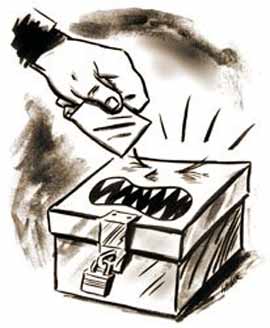
A simple apology would suffice. Instead, campaign finance reformers, horrified by the predictable results of their handiwork, aspire to yet more regulatory wrinkles to limit political speech. These, too, would have consequences unintended and undesired by reformers, "requiring" a new round of reforms. But the Constitution, properly construed, requires a wall of separation between campaign and state.
Reformers detest the emergence of super PACs that fund advocacy supportive of, but not "coordinated" with, particular candidates. These vast reservoirs of money are, however, inevitable, reasonable and, on balance, wholesome responses to the reformers' attempts to combat what they call "too much money" in politics. Reformers have limited the amounts that can be contributed to parties and to candidates' campaigns, thereby limiting the quantity of political advocacy — a.k.a. speech.
To the surprise of no one familiar with political hydrology, money has flowed through crevices in our (fortunately) still porous society, into super PACs. Most political money funds the dissemination of political advocacy to influence elections, and Americans continue to exasperate reformers by finding new ways to speak about politics.
Reformers regret super PACs as a source of "outside" money. Greg Weiner asks: Outside of what? Weiner, an Assumption College political scientist, wonders: Who decreed that campaigns are the private property of the two parties and their candidates? Today, parties and candidates welcome supportive super PACs as a necessity, given the reformers' regulatory regime. But parties and candidates would prefer to receive the money that goes to the super PACs, which can frustrate the parties' and candidates' desires to control America's political conversation.
Super PACs can annoy parties by enabling inconvenient candidates to compete in primaries and can annoy even candidates they favor by forcing certain issues into the campaign dialogue. So, Weiner argues, super PACs are new devices that actually restore something old — an era when "campaigns were communicative free-for-alls rather than regulated, top-down affairs." The First Amendment, which takes no cognizance of parties or candidates, hardly supports making them privileged, semi-exclusive conduits of the political conversations.
Reformers who resent the existence of super PACs, and the reformers' critics who oppose the reformers' regulations of politics that have made super PACs necessary, should ponder Bradley A. Smith's "Separation of Campaign and State" in the George Washington Law Review of November 2013. He argues not just that the quality of America's civic conversation would be improved by the deregulation of politics but also that the Constitution requires this because it contains no enumerated power authorizing Congress to regulate campaigning.
The Constitution speaks only of Congress's power to regulate the "time, place and manner" of elections. Congress has justified the regulation of political speech by conflating what Smith rightly says are two quite different things — campaigns and elections. Campaigns consist of speech and other activities to persuade the public to register particular decisions in elections. Elections are the formal processes by which those decisions are recorded.
The regulation of the quantity, content and timing of political speech is clearly unrelated to regulating an election's "time" or "place." Can Congress, however, wring an implied power to regulate political speech from the enumerated power to regulate the "manner" of elections? No.
The "manner" of an election includes modalities such as the keeping of voter lists, designating polling places and counting votes. The Constitutional Convention's discussion of the times, places and manner clause, Smith notes, "revolved entirely around election administration" and referred "not at all to the process of seeking to persuade citizens to vote in one way or another."
"There is," he says, "no 'on' or 'off' switch on American politics"; campaigning is constant. Elections are occasional, discrete episodes. And "the fact that 'manner' was combined with 'times' and 'places' in the Constitution further suggests that it refers to the details of carrying out the formal process of voting." Listen, Smith says, to the logic of our language. "We do not talk about candidates making 'election stops' as they travel the country talking to voters, but rather 'campaign stops.' . . . We have a 'campaign,' at the conclusion of which voters cast ballots on 'election day.' "
The phrase "a wall of separation between church and state" is from Thomas Jefferson, not the Constitution. But, says Smith, the metaphor's aptness "flows from the document's structure and purpose." So does the propriety of a wall between campaigns and government: It is simply impermissible for the government to regulate the debate that determines if the party controlling this or that portion of the government will retain control.
Comment by clicking here.



 Contact The Editor
Contact The Editor
 Articles By This Author
Articles By This Author